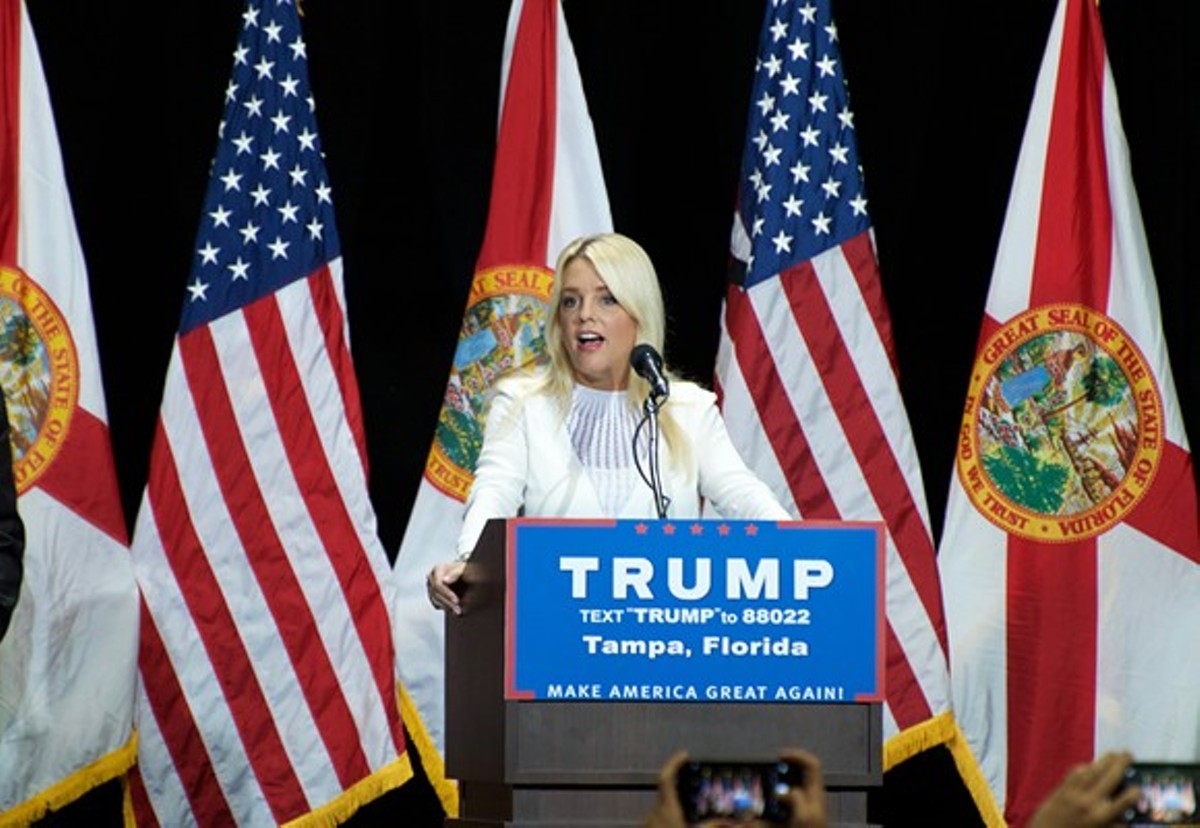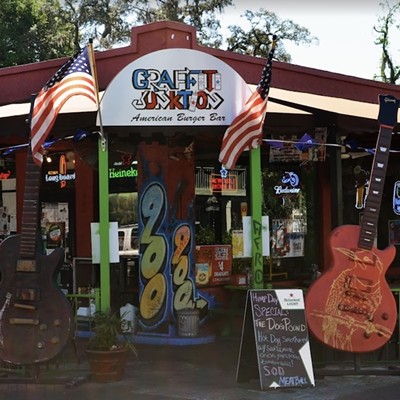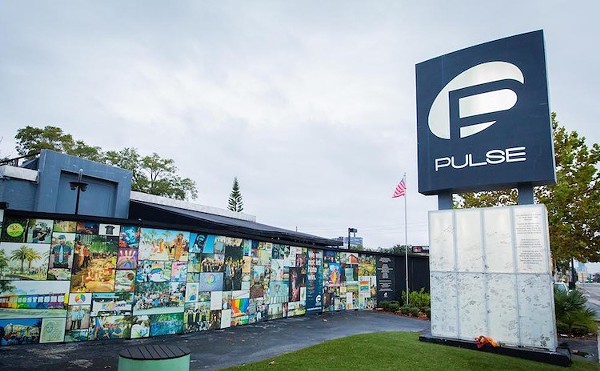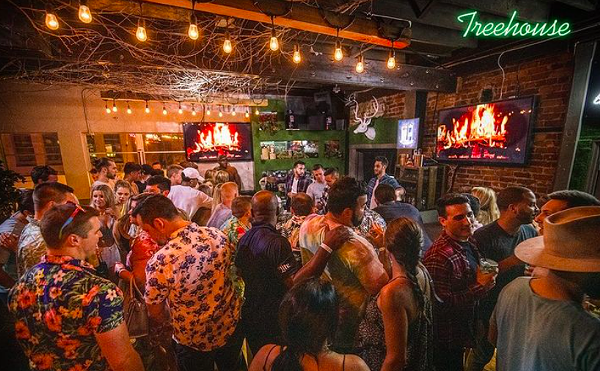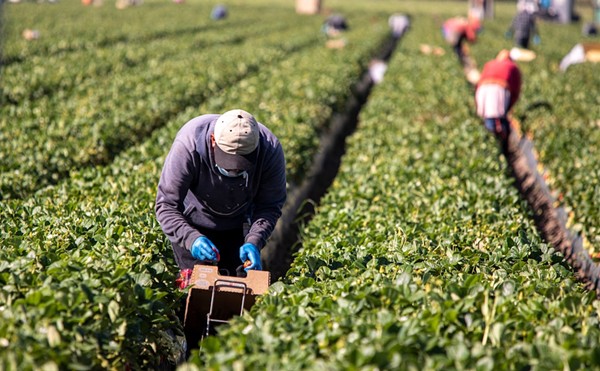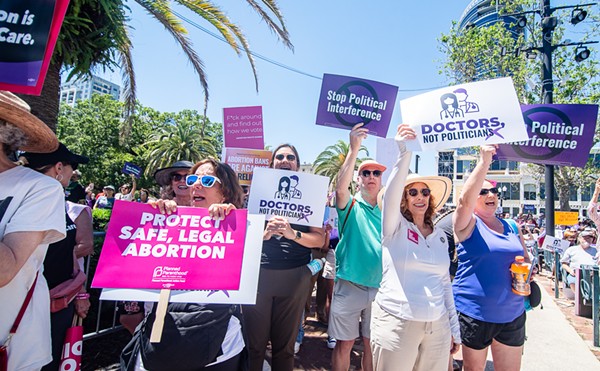Before the end of this month, Florida Attorney General Pam Bondi will have to explain to a Tallahassee judge why her office allegedly directed companies that settled unfair trade actions to donate millions in restitution payments to unregistered charities.
Leon County Circuit Judge Charles Dodson gave Bondi 40 days after April 10 to respond to a petition for a "writ of quo warranto" filed against her by Orlando businessman John D. Smith.
In his complaint, Smith accuses Bondi of abusing her authority when she forced 14 businesses her office was investigating to settle by donating more than $5.5 million to 35 unregistered charities from 2011 to 2016. The lawsuit alleges that in total, Bondi's office collected $20.2 million from 55 companies in "forced contributions" to registered and unregistered charities, including money to charities connected to the attorney general's office. Bondi has denied the allegations, calling them meritless and saying in a statement that Smith "has heaped abuse on my attorneys and continues to target my office. His attacks are completely unfounded."
Behind the lawsuit over charity donations, the saga between the two parties is an extensive, personal fight that, weirdly enough, started over hurricane protection.
Smith is the owner of Storm Stoppers, a business that makes lightweight panels of corrugated plastic that fasten onto doors and windows for use during hurricanes. They're marketed as a "plywood alternative" that can be more easily installed to protect homes from flying debris. The panels don't have to be bolted down like hurricane shutters or plywood. Smith points to several news reports in which hurricane shutters that were left on after storms were blamed for trapping people during fires.
"With Storm Stoppers, you don't need to put bolts in your house, you don't need to trap and kill yourself, you can do it yourself," he says. "It's easy, it works, and it's tested. It's a threat."
Smith says his product probably intimidated other manufacturers of hurricane protection products, so they complained to the attorney general's office that Storm Stoppers were a "danger to the public," according to public records. An email from early 2014 shows Assistant Attorney General Rick Schiffer telling Smith's lawyer at the time that the complaints against his product "appear to have come from the industry, and not from customers."
Bondi's office began investigating Storm Stoppers in 2013 for deceptive and unfair trade practices because it claimed to be a "hurricane protection" product but had not been approved by the Florida Building Commission. State law says a product "may not be advertised, sold, offered, provided, distributed or marketed as hurricane windstorm, or impact protection from windborne debris from a hurricane or windstorm unless it is approved." The attorney general's office offered to settle the investigation with Smith if he agreed to sign an assurance of voluntary compliance agreement, which would include making a donation to a charity. Smith refused, and his lawyers argued before the commission that his product did not meet the requirements for review, as it was sold as an alternative to plywood, not as hurricane shutters.
The commission seemed to agree with Smith's premise until Schiffer began emailing the counsel for the commission to provide clarification, according to public records. Before their decision, the commission agreed to a slightly tweaked version of Smith's argument that now required him to get local approval, not state approval, for his product. The businessman says when he emailed the Hillsborough County building department to find out how he could get Storm Stoppers locally approved, the department had no answer. In a statement, Bondi's office says it dropped its investigation into Smith's product "pending any determination at the local level that the product was being advertised in violation of law."
Still, Smith was upset. He filed a bar complaint against Schiffer for his correspondence with the commission, which Bondi's office called "unwarranted." The attorney general's office says the Florida Bar determined no ethical violations had occurred and closed the investigation.
As Smith was going over the ordeal that had cost him thousands of dollars, he was intrigued by the AVC agreements and a statement by Bondi that her office had returned more than $10 billion to Florida consumers in recoveries.
"I just couldn't believe that," he says. "I feel like if that number, $10 billion, was real, we would have heard about it on the news."
Curious, Smith began compiling data and public records about other AVC agreements that Bondi's office had negotiated with companies like Chase Bank, Dollar Tree and the Home Shopping Network.
AVC agreements that require businesses to donate money to charities can be common – in California, the attorney general's office donates recovered funds to the charity that was harmed or to charities with the same or similar purpose as the party harmed, says Walter Garcia, spokesperson for the California office. A similar practice is followed in Florida, but the statute does not require it. The agreements are typically used when consumer reimbursement is difficult or impossible.
But Smith claims some of the charities Bondi's office was giving money to through these settlements were unregistered. Florida law says charities that intend to solicit contributions or have funds solicited on their behalf must register with the Florida Department of Agriculture and Consumer Services.
Smith alleges that out of the 35 unregistered charities who got money, Bondi's office directed funds toward two charities run by the department, "Seniors vs. Crime" and the "Florida Law Enforcement Officer of the Year Award." In his lawsuit, the Orlando businessman is asking the court to stop the attorney general's office from directing contributions from businesses alleged to have violated fair trade practices to go to unregistered charities and to prevent the office from directing payments to charities with ties to her office.
Smith says he used an online resource from the agriculture department to check whether charities were registered. But a review by the Orlando Weekly found some of the charities Smith claimed were unregistered were actually registered under names that were similar but not exactly as they appear in the AVC agreements. For example, if you type "Gulf Coast Legal Services" into the agriculture department's website, it won't show up at all, but if you remove the space and type in "Gulfcoast Legal Services," the charity shows up as registered. Smith attributes this error to the website itself and says he was only using a resource that Bondi has promoted to other Florida residents for checking charities.
In a statement, Bondi says the practice of using AVC agreements is designed to benefit Florida's citizens while conserving taxpayer resources.
"When my office investigates consumer protection cases, it is often in the public interest to settle when we can protect the public without having to go to court," she says. "In addition to obtaining promises that the targets of investigation will stop unlawful conduct, we are often able to secure promises to make contributions that promote the public good."
Bondi spokeswoman Kylie Mason spoke further about the alleged abuse Smith had directed toward the office.
"Mr. Smith continued to repeatedly call the office and threaten staff with lawsuits and adverse actions long after the attorney general's office had informed Mr. Smith and his counsel that it was closing its investigation," Mason says in a statement. "Mr. Smith went to the Orlando Police, the Orange County Sheriff's Office and the Orlando State Attorney's Office to make baseless complaints about our staff."
Additionally, Mason said there are "no limitations or restrictions under the law relating to the recipients of contributions." Bondi's office says the contribution recipient may be a private nonprofit or a governmental entity, and that AVC agreements do not explicitly require that contributions be made to charities that are registered. Some groups, like religious organizations, educational institutions, state agencies and other government entities are exempt from registration.
Smith remains unconvinced. He says Bondi is already suspect after the way she solicited and received a $25,000 campaign donation from President Donald Trump in 2013 when her office was considering whether Florida should join a lawsuit regarding consumers who claimed that Trump University had defrauded them. Bondi decided not to pursue the allegations then, and ultimately, Trump agreed to a $25 million settlement with students in the New York case after he was elected. A state ethics panel recently cleared Bondi over complaints regarding Trump's donation.
Smith says he's not doing this for retaliation or revenge – he just wants justice for other small businesses like his.
"All I wanted is to be left alone," Smith says. "They drew blood first, not me. I just want one thing from Bondi. She claims my lawsuit is without merit – prove it. I'd go away. Just prove that you didn't donate $5.5 million to unregistered charities when all of your AVCs say you did. And if you can't prove it, just own it. And then when she owns it, I think she should resign."

